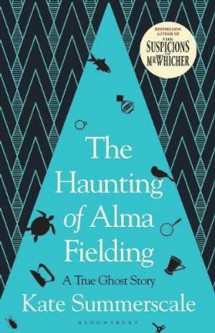The haunting of Alma Fielding, a true ghost story by Kate Summerscale

Bloomsbury, 2020. ISBN: 9781408895443.
(Age: Adult) Recommended. This account of the investigation into the
Alma Fielding poltergeist case of the late 1930's is not historical
fiction, it is a meticulous examination of the extensive records of
ghost hunter Nandor Fodor, which author Summerscale had the good
fortune to recover from the Society for Psychical Research archive
in Cambridge in 2017. She recreates the events of Fodor's
investigation, in the context of the time just before World War II,
where the public imagination was seized by stories of ghosts and
demonic possession along with seances seeking messages from lost
loved ones after the first war.
Nandor Fodor, a Jewish-Hungarian refugee, wanting to affirm his
reputation as a psychical researcher, became obsessed with the case
of Alma Fielding, sensationally reported in the newspapers as a
young housewife who with her husband, son and lodger, had become the
centre of a maelstrom of flying household objects, a smashing
wardrobe and other strange disturbances. Fodor, open to the idea of
spirits and mediums, yearned for proof of another realm, and wanted
to establish scientific evidence for the spiritual world. Many times
he was disappointed, with his research exposing hoaxes and
fraudulence, but with Alma Fielding he hoped to have at last found
the genuine thing.
The story moves through three sections, the ghost hunter, the ghost
hunt, and then the ghost herself, as Fodor moves from hauntings to
gradually develop a theory of psychological disturbance and buried
memories of loss and abuse.
In continually wanting to establish scientific evidence, in the
determination to remove any chance of artifice, with the tests of
Alma's truthfulness and searches of her body, Fodor finds himself
facing the same dilemma as the protagonist of The
wonder by Emma Donoghue (2016) - is he complicit in
contributing to the young woman's psychic disturbance? Is he also
causing her harm and compounding her distress?
However, unlike Donoghue's work of historical fiction, with
Summerscale's non-fiction approach, we are just presented with the
known facts, and are left to imagine the rest for ourselves. It is
an intriguing story nonetheless, of the ideas at the time of Freud's
notion of female hysteria, and would appeal to readers who like a
fact-based approach.
Themes: Poltergeists, Ghosts, Spiritualism, Mental trauma, Psyche.
Helen Eddy